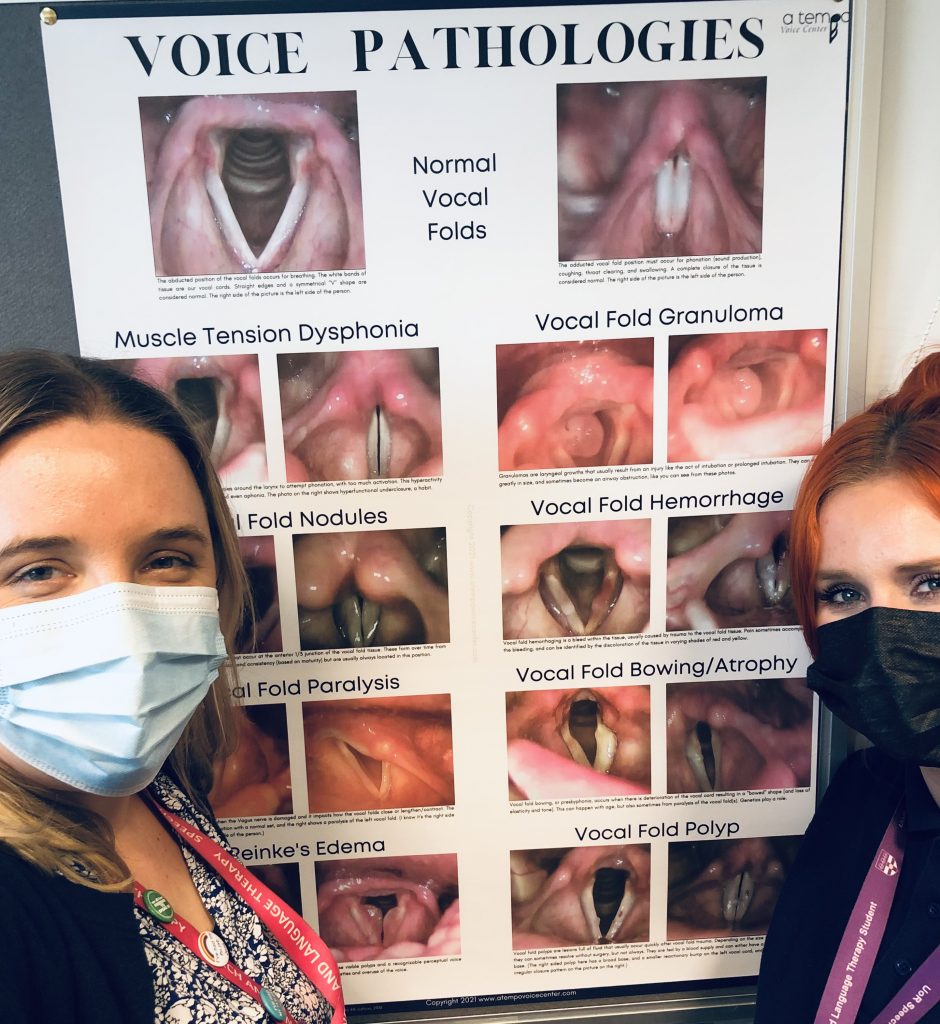
My journey to a voice specialty
My journey into speech therapy started in 2000 when a career advisor at my school did an online survey with me, asked me a whole load of questions about myself, my strengths and weaknesses, hobbies, values and the computer pinged out suggestions for me. Up flashed ‘Allied Health Professions’ with Speech Therapy at the top of the list. So my incredibly supportive mother helped me ring around local hospitals and speech therapy departments and I spent half of my summer holiday break after GCSEs shadowing therapists in a host of different specialties. I was so lucky, it’s much more difficult to do that now.
I spent four years at Newcastle University in the North East of England. Four brilliant years making friends for life, partying like only students can and of course working blooming hard to become qualified. During that time I had a very inspiring placement in North Tyneside with a therapist called Helen where I got experience with a voice caseload. Almost instantly there was no looking back. Clinical placements are a huge influence on students and I remember this every time I have a student on placement with me now.
At the point of graduating in 2007 I applied for any job I could find that had some voice work included. I was limited by location in as such that I knew I wanted to live in London but was happy to commute. I got my first job at Wexham Park Hospital in Slough and it was a bit of everything. Acute, community, neuro and voice caseloads. I’m pleased it was a mixed post for optimal experience and I gained my post grad dysphagia competencies and years of experience on stroke and general inpatient wards. But my manager at the time Eileen Daniel was a voice specialist an a great inspiration and I learnt so much from her. Within three years I’d decided that voice was the only specialty for me. Thanks to her support, flexibility and managerial planning I was able to go full time in a voice specialist role. Mr Nigel Bleach was my ENT inspiration at that time and he taught me so much that I needed to know during those years about the voice clinic and the joint management of voice disorders.
Of course post graduate training funds were limited but each year I attended various study days, voice Special Interest Groups, BVA days and courses such as Accent Method, Lee Silverman Voice Treatment, CBT skills for psychogenic voice and in house CPD sessions were invaluable. Some of it was self funded, this was frustrating and hard at times but completely worth it in the long run. Now I would advise new voice therapists to pick their CPD carefully and take advice about which courses are right for them and when in their career. You don’t need to do everything at once. And there’s plenty to be gained from reading a voice book or searching online and social media for amazing videos and graphics which are often free! I worked with a scruffy set of informal voice competencies for the first 12-24 months i worked in voice and thankfully had accessible and fantastic clinical support.
I was in my first job for seven years but, after having a baby, we moved house and it was time to move on so I took a two year role in High Wycombe Hospital where I could focus on my advanced clinical voice skills.
I had always wanted to work at the John Radcliffe Hospital in Oxford. I’d known the area and heard that the voice team, Penny Lennox, Caroline Fraser and Carol Harris were brilliant. In early 2017 the timing was just perfect and I was offered a clinical lead role in ENT. The role also included being student coordinator for the adult SLT team and a day funded by the community team to train and supervise the development of voice skills amongst the community SLT team. This was a wonderful opportunity to be involved in the organisation of student’s placements and the process of supporting therapist colleagues with their voice skills. I created a set of three level voice competencies for the Developing, Specialist and Consultant Voice Clinician. And I had opportunity to create and trial different ways that knowledge and skills could be achieved to reach competency, as well as train and supervise therapists in groups and one to one.
As part of my private practice VoiceFit I have been supporting students who want more voice knowledge, speech therapists who want to develop in voice and practitioners returning to work. And thus the idea of an online voice skills and competency course came about. By the end of 2021 I will be launching a 6 module online voice skills course that will be designed alongside a set of voice competencies for the developing voice therapist (Level 1). The course will be online and designed to be completed alongside a voice clinical caseload. Supervision with me with be part of the package over a 3 month period. Keep your eyes peeled on my social media and website for more information.
Opportunity and support along the way were the two biggest factors allowing me to specialise in voice. I am forever grateful to those that helped me along the way and to all those who keep it possible. Thank you.
If you want any support or ideas about how to specialise in voice or further your voice knowledge and skills you can contact me anytime on Instagram or at torspence@voicefit.co.uk.
The photo is of me and Simone Such, a final year SLT student at the University of Reading and on placement with me. 2021. The Voice Pathology Poster is by Kristie Knickerbocker at A Tempo Voice.
Category: SLT development